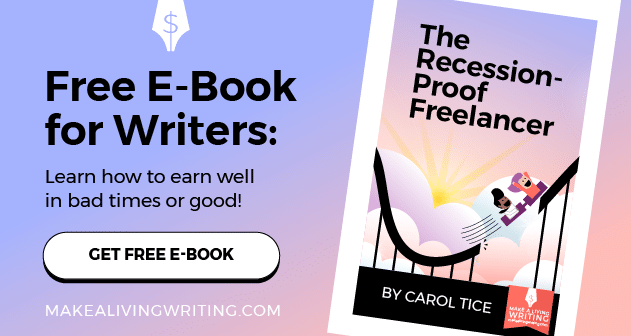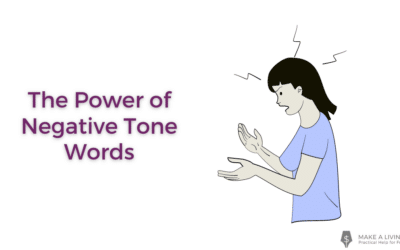Let’s face it. When you’re writing at home, there’s potential for distractions, time wasters, and lost productivity.
Kids, laundry, dirty dishes. Without a boss looking over your shoulder, there’s potential for getting sucked into a digital diet of social media when you’re supposed to be writing at home.
And then there’s days spent rolling around on the floor, doubting your skills, wasting valuable time you could spend on writing and marketing.
Sound familiar?
Even the most successful freelance writers have their own stories to tell about writer’s block, self-doubt, and time-wasting activities that get in the way of writing at home and making money.
Are you programmed to fail? Are you better off working a 9-to-5 where someone tells you what to do every minute of the day?
Or are there some things you can do to boost productivity and be more creative to make a living writing?
If you’re ready to take a closer look at what’s going on inside your head, check out these time-saving tips from the guy who wrote the book Productivity for Creative People.
Meet productivity expert and coach for creatives Mark McGuinness

Mark McGuinness
Mark McGuinness is an award-winning poet and a coach for creative professionals.
He’s the host of The 21st Century Creative Podcast where’s he’s interviewed successful writers and creatives like Steven Pressfield, Joanna Penn, and many others.
He’s also the author of Productivity for Creative People, 21 Insights for 21st Century Creatives, and several other books.
Early in his career, Mark trained to be a psychotherapist. He specifically worked with writers, actors, and directors. And discovered a curious thing about creatives to help them.
“They work with their heart and their soul,” says Mark. “You need to know that about yourself to get unstuck and move forward with your work when you’re writing at home.”
Ready to learn how to boost productivity and get more work done? Check out Mark’s top tips for freelance writers.
1. Get your mind right BEFORE you start your day
I get up in the morning and I decide what I want to work on. That’s going to be something meaningful and important to me, something I really want to do.
But a lot of freelancers skip this step. Before you jump into a project, start writing at home, or marketing, stop and ask yourself:
- Are you in the right line of work?
- Is this type of writing or project really what you want to be working on?
- Is this the kind of client you want to work with?
- Have you lost motivation to be a freelance writer?
It’s easy to think answering these questions are a waste of time when you’ve got a deadline, or you’re marketing like crazy to get clients. But it’s worth the effort to get your mind right and take a minute to recent.
It’s how you wake up Monday morning, turn on your computer, and suddenly your pride and joy, your lovely hobby, is now your work, too.
2. Boost confidence with freelance writing wins
You land a new client. You’ve got a type of writing assignment you’ve never done before. You’ve got a call with a prospect scheduled that could pay you pro rates for your work…and you’re terrified:
- Who are you to be a freelance writer?
- What makes you think you’ll ever find well-paying clients?
- Are you going to fail?
- Are you going to be able to make your clients happy?
This kind of fear-based thinking and self doubt takes a heavy toll on productivity when you’re writing at home.
So how do you interrupt this kind of negative thinking?
It’s pretty simple. Go back to a really positive experience you’ve had as a writer.
That might be from school, a piece you worked on a long time ago, or the assignment you turned in last week.
Go back to the honeymoon phase, when you were writing at home for joy and the pleasure of it.
When you remind yourself of your wins, it’s a confidence AND productivity booster.
3. Dream big…make friends with fear
One of the things I love to say to clients is:
The bigger the dream, the bigger the fear. If there is no fear associated with it, it’s not a very big dream.
When you’re not really daring or dreaming big, it’s easy to get stuck, feel unmotivated, and sit around doing nothing.
It’s a trap that can waste a lot of time…days, weeks, months…even years.
Ever had thoughts like this?
- You honestly don’t know in advance if writing at home is going to work out…So why bother?
- There’s no cost or guarantee that says a new client or writing assignment will turn into something bigger…So what’s the point?
You’ve got to learn to deal with this.
When you look at fear a little differently, it’s actually a good sign. It’s something you can use to:
- Motivate yourself write a pitch, send an LOI, or pick up the phone
- Finish a writing project on deadline
- Do more marketing even if you’re not sure you’ll hear back from those prospects
The truth about fear…
It’s normal for every freelancer writer, beginner or advanced. It doesn’t mean there’s anything wrong with you. And it doesn’t mean you can’t succeed.
It is an occupational hazard of being a freelance writer. Fear is always going to be there, so you might as well learn to make friends with it.
4. Discover your most productive time for writing at home
When I work with freelancers, they’ll sometimes say:
You must be so disciplined to get up and write every morning.
No. No, I’m not. It’s is not about discipline.
To me, discipline is an employee’s word. It suggests that you’re not an adult, and you need to have somebody tell you what to do.
It’s not about discipline. It’s about desire, motivation, and working habits and routines you develop as a freelance writer.
If you want to be more productive, take time to answer questions like:
- Where do you feel most creative and productive?
- What time of day is your best window for writing, marketing, and working on client projects?
- When do you feel tired, drained, less motivated?
- What’s the best time of day to do non-writing tasks?
This exercise allows you to build a daily routine around your creative process and maximize productivity to get more work done, and enjoy doing it.
5. Beware of Open-Prairie Syndrome
If you’re used to the traditional 9-to-5 where you clock in and clock out, going freelance can leave your schedule wide open.
You know…you’ve got the whole day to yourself, and you could do anything.
It’s like being out on the open prairie.
It just stretches out in all directions. There are no sign posts. There are no boundaries.
On one hand, all the unknowns and endless possibilities can be a little scary. On the other hand, it opens the door to procrastination, and you start thinking:
“Well, I’ve got all day to do this. Maybe I’ll just start and ease myself in gently with some email. I’ll check out Facebook. Maybe I’ll flap about in the filing cabinet.”
And then you basically spend an entire morning, or an entire day trying to avoid getting down to work, completing an assignment, or marketing.
How do you protect yourself from Open-Prairie Syndrome?
Put hard edges on your day
Create some rules about how you spend your time, like:
- I do my best writing and creative work in the (morning, afternoon, or late at night)
- I start writing by (pick a time)
- During my scheduled writing time, I’m not going to mess with email, Twitter, Facebook, or admin work
- When I notice resistance during writing time, I’ll do it anyway because it’s when I’m most creative and productive.
When you plan your day this way, it’s not coming from a boss or a manager. It’s a structure you’ve created for yourself. And it’s a way of getting to do what you want to do every day of your working life.
6. Stay connected with other freelance writers
I know what it’s like to be deeply introverted. Some days you’re busy writing, you get lots of work done, and you feel good about it.
Other days, it’s just you…in a room…with the computer…and it starts to weigh on you. It’s very easy for doubts to loom large:
- I’m procrastinating…a lot. What’s wrong with me?
- I’m feeling afraid, like I’m totally going to fail at this.
- I’m feeling lonely and bored. None of my client work is interesting anymore.
When you work in isolation writing at home, it’s totally normal to have these thoughts at times.
How do you prevent this from holding you back as a freelance writer?
Connect with other freelance writers
Being part of a writer community isn’t just a place to develop skills, network, or socialize. When you meet and talk with other writers, even if it’s online, writer’s start to realize:
“Oh, it’s not just me. This is just part of the life. This is part of the path. It’s a lot easier to be a freelancer and come up with solutions to problems, when I can ask my writer friends.”
7. Remember…productivity takes practice
Nobody wakes up with magical powers to crank out amazing copy, write stories, and come up with winning ideas all day. It’s a learning process.
Learning to be productive and manage your time well takes practice, too. If you try a new routine and it doesn’t work, change it.
Come up with something else. Give your new process, writing time, or whatever it is, at least a week, and see how it goes. Make one small change at a time, instead of trying to change everything at once.
Enjoy the freelance life writing at home
One of the big reason’s you’re a freelance writer is freedom…the ability to work from home and make a living writing.
It takes practice to be a great writer. It takes practice to learn how to manage your time to be more creative, move up, and earn more. And you can do it…one day at a time. Keep going!
What are you best productivity tips for writing at home? Share yours in the comments below.
Evan Jensen is the blog editor for Make a Living Writing. When he’s not on a writing deadline or catching up on emails, he’s training to run another 100-mile ultra-marathon.












